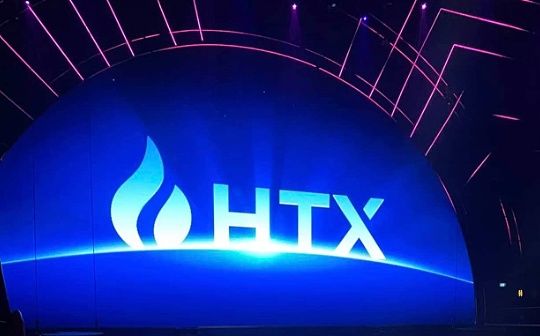
Deng Tong, Bitchain Vision
On May 29, Musk confirmed the resignation in his post X and thanked President Trump for “giving opportunities to reduce wasteful spending.”The White House “removed” Musk from his position as a special government employee on Wednesday night local time.
1. Why did Musk leave DOGE?
The direct reason is Musk’s identity – a special government employee.Musk once said he would perform his duties as an external volunteer, and the White House later confirmed that he would work as an unpaid special government employee.This means he needs to participate in 130 days of federal work in a year.
From the inauguration of Trump on January 20, he will reach 130 days of working hours by the end of May, so from the hard rules, Musk leaves the White House by the end of May.
But without this rigid rule, can Musk continue to work in the White House?
2. Are Musk happy with his 130-day trip to the White House?
1. Disappointed with Trump’s bill
In an interview clip shared by CBS on Tuesday, Musk pointed out that he was “disappointed” with Trump’s budget bill, a Republican-backed bill that would increase trillions of dollars in federal debt (mainly through permanent extension of large-scale tax cuts).
“Frankly, I’m disappointed to see this huge spending bill, which not only did not reduce the budget deficit, but instead increased the budget deficit and also undermined the work of the DOGE team. I think a bill can be huge and beautiful. But I don’t know if it can have both.”
When White House reporters asked Trump to respond to Musk’s criticism on Wednesday, he did not respond directly, just saying: “We will negotiate on the bill, and I’m not happy with some of it, but I’m excited about others. That’s how they act.”
Musk made a public statement, the Republican bill is about to be submitted to the Senate for review, and several Senate senators also criticized the bill for increasing the deficit.The bill covers many of Trump’s priorities and he has urged Congress to send the bill to his desk to sign it “as soon as possible.”
Asked how to respond to Musk’s criticism of the Republican domestic policy bill passed by the House, Trump said: “We have to get a lot of votes”, adding that “we can’t cut spending” unless detailed.”We’re going to negotiate this bill, and I’m not happy with some aspects of it, but I’m excited about the others. That’s what they do. It’s a big and beautiful bill.”
House Speaker Mike Johnson, Louisiana Republican, defended the Republican Budget Act on X, saying it was based on the work of the Department of Government Efficiency Team that Musk overseen.”The House ensures that the success of the Department of Government Efficiency (DOGE) is continued in the One Big Beautiful Bill,” Johnson said.
Trump adviser Stephen Miller noted that “The Department of Government Efficiency (DOGE) has achieved savings in discretionary spending, such as funding agencies, and our One Big Beautiful Bill has achieved more than $1.6 trillion in mandatory spending, such as Medicaid. Both bills are historically significant and have taken a huge step to addressing our debt and deficits.”
2. Musk faces lawsuit for “illegal exercise of federal government operation powers”
On Tuesday, a U.S. District Court judge ruled that lawsuits accusing Musk and the Department of Efficiency of the Government illegally exercised federal government powers could continue.
U.S. District Judge Tanya Chutkan issued a 42-page order on the lawsuit, filed by several Democratic state attorneys generals.The order dismissed a motion to dismiss a case, but Chutkan approved a motion to dismiss President Trump’s defendants, ruling that “the court shall not prohibit the president from performing his official duties.”
The ruling highlights the often conflicting descriptions of Musk and DOGE entities being given the power to implement Trump’s agenda, and how public statements and actions undermine efforts to downplay such power in court.
“At present, states seem to have reason to accuse Musk of making decisions about ‘federal spending, contracts, government property, and the existence of federal agencies’.” States accused Trump of giving Musk and the Department of Government Efficiency (DOGE) broad powers to allow them to conduct mass dismissals, termination of grants and contracts and access to sensitive government data without Congress’ approval, in violation of the constitution’s appointment clause.
New Mexico Attorney General Raul Torres said in a statement that Tuesday’s ruling “is an important milestone in upholding the U.S. checks and balances system. We are proud to advance the case and help end Musk’s reign of terror.”
3. Tesla’s performance declined sharply
Starting from February this year, protests broke out outside Tesla stores in many places across the United States.Since Musk’s efforts to cut costs in the Trump administration’s efficiency department have hurt the Tesla brand.In the United States and Europe, multiple Tesla showrooms were destroyed and consumers also launched boycotts due to people’s dissatisfaction with their political stance.
Musk once pointed out: “They do like to burn my car, which is not great.” Trump said: “You really sacrifice a lot, and they are very unfair to you.”

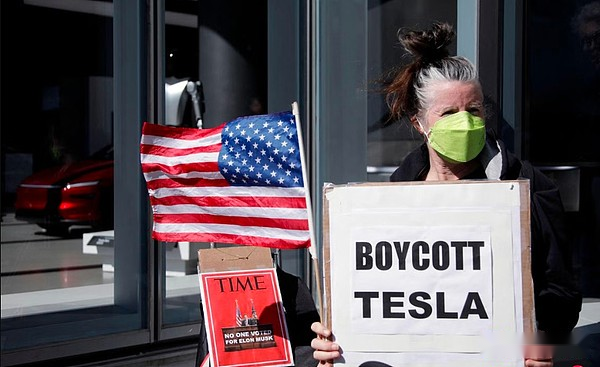
According to the financial report released by Tesla on April 22, as of March 31, Tesla Auto’s net profit was US$420 million, a sharp drop from US$1.405 billion in the same period last year.Tesla’s net profit attributable to common shareholders in the first quarter was US$409 million, a sharp drop of 71% compared with US$1.39 billion in the same period last year; diluted earnings attributable to common shareholders were US$0.12, a 71% decrease from US$0.41 in the same period last year.
According to the Wall Street Journal, as the company’s profits and stock prices both declined, Tesla’s board of directors began contacting several executive headhunting companies about a month ago to look for Musk’s successor.Investors are concerned that Musk has invested too much time in positions that cut costs to the U.S. government.Board members asked Musk to invest more time in the company.
However, Tesla publicly denied the report on May 1.Musk is still regarded as Tesla’s soul.Wedbush Securities analyst Dan Ives once said: “Tesla is Musk, and Musk is Tesla.” However, Tesla is currently facing difficulties: aging product lines, intensifying competition in China, and Musk’s controversial political remarks have caused both product demand and profit to decline.Deutsche News Agency commented that Musk’s move in Washington and his right-wing political views have also led some potential buyers to stay away from Tesla.Analyst Ives estimates that long-term demand for Tesla vehicles could fall by 15% to 20%.
In addition, Tesla has also been involved in Trump’s tariff trade war to a certain extent.Although most of Tesla’s cars are produced in the United States, the company needs to purchase some materials from abroad, which will face import taxes.China’s pressure will also damage Tesla’s profits.Earlier this month, the company was forced to stop accepting orders from mainland customers for the Model S and Model X models.
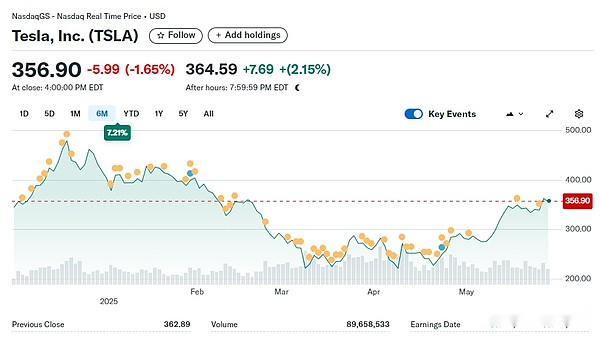
Musk said last week that he had to be “highly focused” on his company and “had returned to being at work 24 hours a day and sleeping in a conference room/server/factory room.”
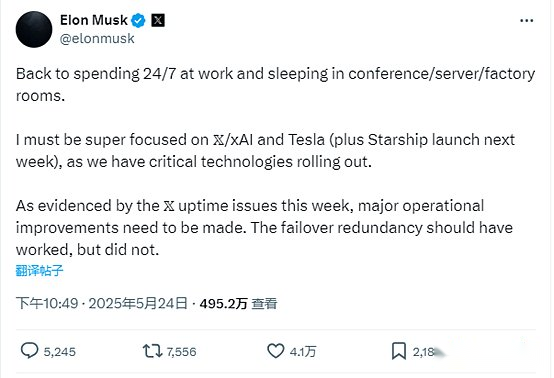
3. Has DOGE really saved money?
DOGE claims to save an average of more than $10 billion a week since President Trump took office.But actually, has it really saved so much money?
In October last year, Musk promised to cut the federal government’s budget “at least $2 trillion.”He then cut the target in half and said on April 10 that he would save $150 billion by “reducing fraud and waste” by the end of fiscal 2026.The U.S. federal budget for the last fiscal year was $6.75 trillion.
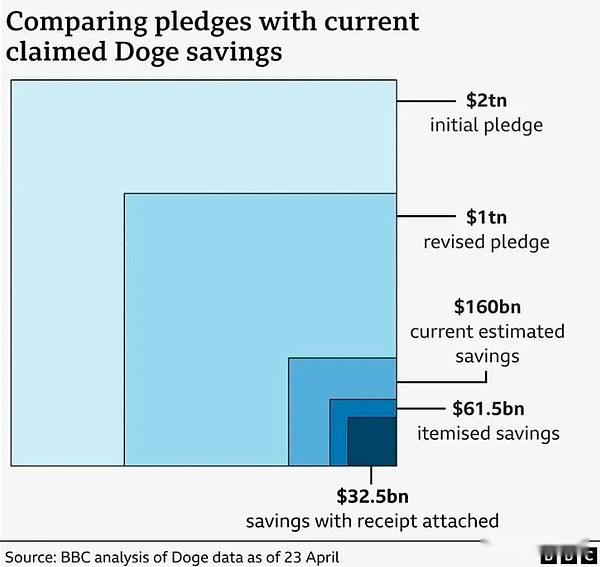
The US media also exposed some calculation errors, such as Doge misrepresented that he saved $8 billion by canceling an immigration contract worth $8 million.
Doge said they are working to upload all receipts in an “easy to understand and transparent way” and as of April 20, its published receipts “make approximately 30% of the total savings.”In addition, they also listed some receipts that were “unable for legal reasons”.
The largest personal savings listed by Doge are $2.9 billion.
The money comes from the cancellation of a contract that took effect during Biden’s presidency in 2023 – which aims to provide shelter to up to 3,000 unaccompanied immigrant children at a Texas facility.Doge appears to have minus the total contract amount minus the expenditure so far, resulting in the figure of $2.9 billion.But in reality, Doge’s numbers are “based on speculative, never-used numbers” and actual spending depends on how many children are placed at the facility and the services they need.”In fact, the government has never borne these costs and will never reach this ceiling. It is estimated that the actual savings of early termination of the contract are about $153 million.”
Doge’s second biggest savings listed by the company comes from canceling the contract between the IRS and an IT company called Centennial Technologies — a contract worth $1.9 billion.However, some government departments have problems with poor record keeping, which means that the amount of expenditure on certain contracts may not be updated in time.And the CEO of Centennial Technologies has pointed out that the agreement was actually cancelled during the Biden administration last fall.
Some analysts believe that the budget recently passed by the House of Representatives only approved $9.3 billion in institutional cuts, less than 5% of Musk’s initial $2 trillion annual throttling target.”DOGE’s thunder is loud and rains are small, and the actual throttling may be much less than $10 billion,” said Jessica Riedl, budget analyst at the Manhattan Institute. “Political reality reveals the essence of DOGE, which may be just a superficial cost-cutting performance, and the “stubborn disease” of the federal budget has not moved at all.Members of Congress firmly control various institutions in the executive branch, and even Republicans are unwilling to let “charitable police” like Musk interfere with their territory.”
4. Will DOGE continue to operate after Musk leaves?
On Thursday, the Wall Street Journal reported that about 100 DOGE employees will remain in various government departments after Musk left.The White House has also stated that U.S. President Trump’s cabinet members will work with the government efficiency staff of various federal agencies to advance ongoing work.White House Press Secretary Caroline Levitt said cabinet ministers “have been working closely with Musk and will continue to work with government efficiency staff in these institutions who are on board as politically appointed.”
Musk and Trump set a deadline for DOGE to complete the work, which coincides with the 250th anniversary of the signing of the Declaration of Independence. Trump signed an executive order to establish the Doge project on the day of the inauguration ceremony in January this year, which mentioned that the termination date of Doge is July 4, 2026.
Back in December, Musk responded to a tweet, “The last step for DOGE is self-destruction.”
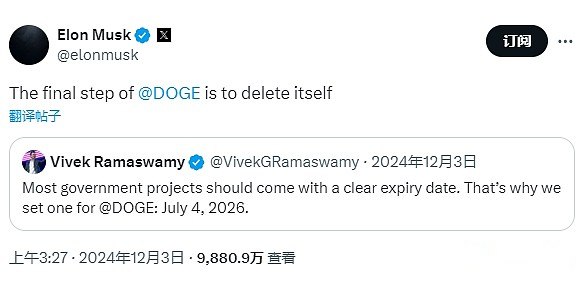
But former government efficiency employee said in his first interview after his departure that as Musk leaves the Trump administration, his leading government efficiency improvement program is likely to stagnate.Software engineer Sahil Lavi predicted that the department would quickly “stop” after working at DOGE for nearly two months.”It’s like a dying whimper,” said Ravengia, who was fired earlier this month. “The charm of this project is Musk himself.”He expects DOGE employees to “stop work one after another, just like kids joining a startup that will go bankrupt after four months.”
Source: Bitchain Vision, BBC, Reuters, Bloomberg, Washington Post, NBC, NPR, etc.

